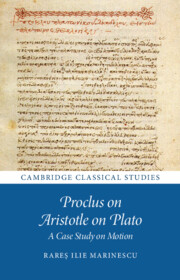Proclus on Aristotle on Plato
This is a study of Proclus’ engagement with Aristotle’s theory of motion, with a specific focus on Aristotle’s criticism of Plato. It refutes the often-held view that Proclus – in line with other Neoplatonists – adheres to the idea of an essential harmony between Plato and Aristotle. Proclus’ views on motion, a central concept in his thought, are illuminated by examining his Aristotelian background. The results enhance our view of the reception and authority of Aristotle in late antiquity, a crucial period for the transmission of Aristotelian thought which immensely shaped the later reading of his work. The book also counteracts the commonly held view that late-antique philosophers straightforwardly accepted Aristotle as an authority in certain areas such as logic or natural philosophy.
RAREș ILIE MARINESCU is a Postdoctoral Fellow in Classics (Ancient Philosophy) at the University of Toronto.

